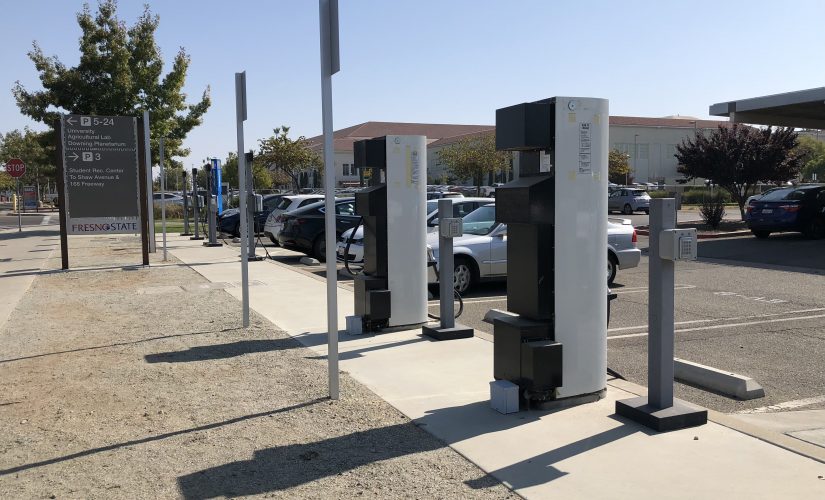Electrical vehicles may be important to the community for various reasons.
They can improve air quality, reduce asthma and respiratory rates, limit air pollution and the may enhance overall quality of life.
At least that’s how Fresno State’s administration and finance transportation sees it.
“There’s a lot of benefits to owning (an electric car),” said Derek Brantley, interim parking and transportation manager at the Fresno State Police Department. “Benefits for the commuters because you don’t have to waste gas, as well as the different tax incentives that come for those that buy the car, which is creating a higher demand for them and creating a higher demand for the parking stalls for them.”
More and more electric vehicles are appearing on campus. There are currently six charging stations at Fresno State.
According to Brantley, there is a demand for more charging stations on campus, a demand that has been considered in the planning of upcoming projects. The police department receives plenty of feedback from the public asking about the stations through calls or on the university president’s feedback page, he said.
Currently, university officials are in the schematic design process for renovating Parking Lot 27, located near the campus housing. Using the land more efficiently will then possibly allow 80 to 100 additional spaces for parking. Along with creating more parking space, there will be infrastructure for several electric vehicle charging stations to potentially spread them out around campus for convenience, according to Brantley.
For now, signs have been updated at the six stations to establish parking rules and regulations for electric vehicles (EV).
“We didn’t change the regulations for EV. No, we had to create regulations for EV,” Brantley said. “We didn’t have anything, so it was important that we sit down and look at what other CSUs do, and we looked at some of the issues that we were having.”
One of the issues occuring on campus was that local car dealerships parked their electric vehicles at the stations and charged them for hours, leaving staff and students with no opportunity for recharge, said Brantley.
The university does not charge for the power, but it does require a parking permit.
“If you’re gonna be here, at least purchase a day permit or some type of permit to create some kind of credibility, considering we’re not charging for the power like most places do,” said Brantley.
Brantley’s goal is to have the chargers efficiently utilized by everyone who needs them, not write up citations.
That is why the regulations that the police department has implemented have been more lenient toward drivers, in hopes to educate the public, according to Brantley.
“At the end of the day, we’re just about having them available. That’s the goal,” said Brantley. “Having people to comply without giving tickets.”Among the six charging stations, there are two fast-charging stations and four slower-charging stations. After downloading the LibertyHydra application on one’s phone, one can activate the pump and follow the different steps. There are also instructions provided on each charging station and on the Fresno State Police Department website.




